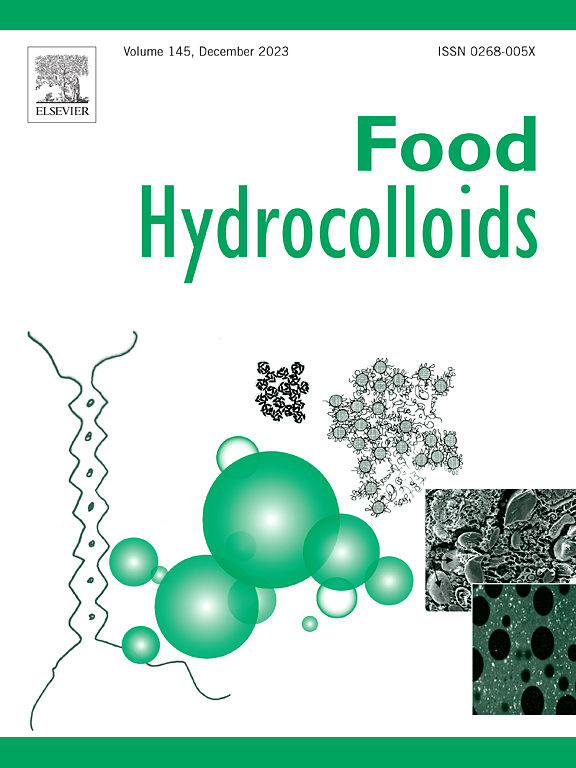Development of alginate-based active edible coating with Brassica juncea and Raphanus sativus sprout extracts to extend tomato shelf-life
IF 11
1区 农林科学
Q1 CHEMISTRY, APPLIED
引用次数: 0
Abstract
Extending the shelf life of fresh produce using sustainable, bio-based preservation methods is an exciting and rapidly growing area of research, driven by the need to reduce food waste and meet consumer demand for chemical-free alternatives. This study presents the development of an alginate-based active edible coating incorporating Brassica juncea (GM) and Raphanus sativus (RT) sprout extracts to prolong tomato shelf life. The coating was prepared by modifying glycerol-plasticized alginate (A) with zein/chitosan (Z/CH) microparticles (MPs) containing the sprout extracts as bioactive antimicrobial and antioxidant agents. The physicochemical properties of the films were characterized using FTIR, SEM, TGA/DSC, contact angle, water vapor permeability, and tensile testing. FTIR analysis revealed interactions between alginate and MPs, TGA confirmed thermal stability, SEM showed uniform MP dispersion, and tensile tests indicated improved flexibility with extract addition, enhancing coating suitability. Encapsulated extracts increased antioxidant activity, achieving 52 % DPPH inhibition for GM and 70 % for RT. The antimicrobial assay demonstrated that RT-formulated films showed moderate biocidal activity against Bacillus cereus and Salmonella enterica, highlighting their potential to improve food safety. Furthermore, tomato shelf-life testing revealed a 30-day extension using RT-loaded MPs, with no visible changes in appearance or texture. These findings suggest that encapsulating RT in plasticized alginate coatings enhances tomato longevity and quality, supporting the use of edible films for active food packaging applications.

以芥菜和莴苣芽提取物为原料制备海藻酸盐基可食用活性涂层以延长番茄保质期
利用可持续的、基于生物的保存方法延长新鲜农产品的保质期是一个令人兴奋的、快速增长的研究领域,这是由减少食物浪费和满足消费者对无化学替代品的需求所驱动的。本研究提出了一种海藻酸盐为基础的活性食用涂层,其中含有芥菜(GM)和莴苣(RT)芽提取物,以延长番茄的保质期。采用玉米蛋白/壳聚糖(Z/CH)微颗粒(MPs)对海藻酸酯(A)进行改性,制备了具有生物活性的海藻酸酯抗菌剂和抗氧化剂。采用FTIR、SEM、TGA/DSC、接触角、水蒸气渗透性、拉伸性能等测试手段对膜的理化性质进行了表征。FTIR分析表明海藻酸盐与MPs之间存在相互作用,TGA证实了MPs的热稳定性,SEM证实了MPs的均匀分散,拉伸试验表明添加萃取物可以改善涂层的柔韧性,增强涂层的适用性。胶囊提取物提高了抗氧化活性,对转基因的DPPH抑制率达到52%,对rt的抑制率达到70%。抗菌实验表明,rt配方的膜对蜡样芽孢杆菌和肠沙门氏菌具有中等的杀灭活性,突出了其提高食品安全的潜力。此外,番茄保质期测试显示,使用rt加载的MPs可以延长30天,外观或质地没有明显变化。这些发现表明,在增塑型海藻酸盐涂层中封装RT可以提高番茄的寿命和质量,支持可食用薄膜用于活性食品包装应用。
本文章由计算机程序翻译,如有差异,请以英文原文为准。
求助全文
约1分钟内获得全文
求助全文
来源期刊

Food Hydrocolloids
工程技术-食品科技
CiteScore
19.90
自引率
14.00%
发文量
871
审稿时长
37 days
期刊介绍:
Food Hydrocolloids publishes original and innovative research focused on the characterization, functional properties, and applications of hydrocolloid materials used in food products. These hydrocolloids, defined as polysaccharides and proteins of commercial importance, are added to control aspects such as texture, stability, rheology, and sensory properties. The research's primary emphasis should be on the hydrocolloids themselves, with thorough descriptions of their source, nature, and physicochemical characteristics. Manuscripts are expected to clearly outline specific aims and objectives, include a fundamental discussion of research findings at the molecular level, and address the significance of the results. Studies on hydrocolloids in complex formulations should concentrate on their overall properties and mechanisms of action, while simple formulation development studies may not be considered for publication.
The main areas of interest are:
-Chemical and physicochemical characterisation
Thermal properties including glass transitions and conformational changes-
Rheological properties including viscosity, viscoelastic properties and gelation behaviour-
The influence on organoleptic properties-
Interfacial properties including stabilisation of dispersions, emulsions and foams-
Film forming properties with application to edible films and active packaging-
Encapsulation and controlled release of active compounds-
The influence on health including their role as dietary fibre-
Manipulation of hydrocolloid structure and functionality through chemical, biochemical and physical processes-
New hydrocolloids and hydrocolloid sources of commercial potential.
The Journal also publishes Review articles that provide an overview of the latest developments in topics of specific interest to researchers in this field of activity.
 求助内容:
求助内容: 应助结果提醒方式:
应助结果提醒方式:


